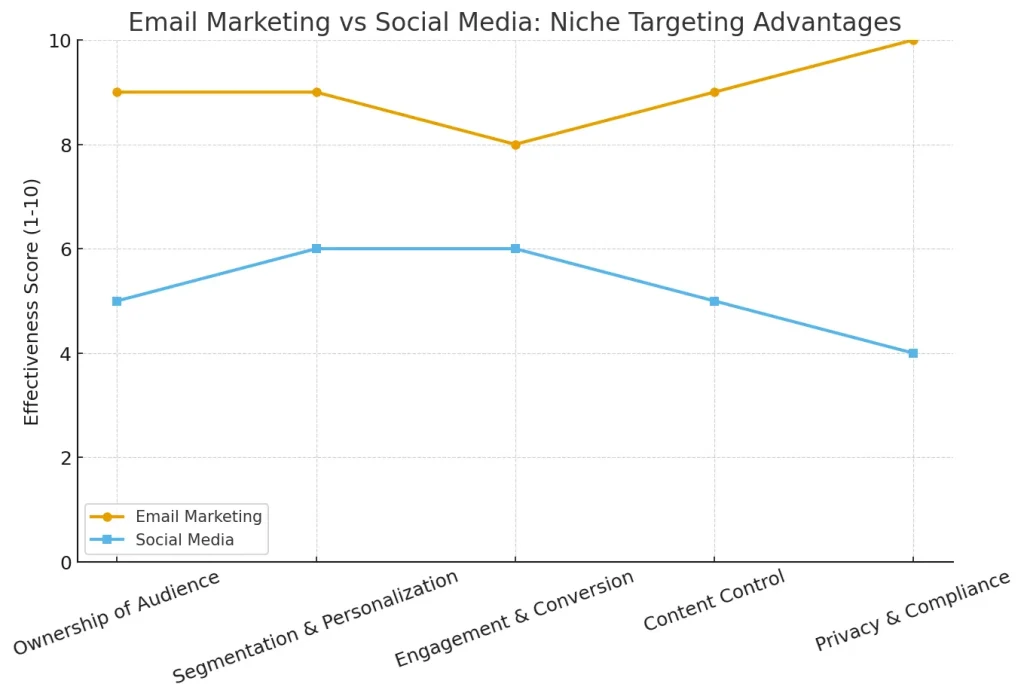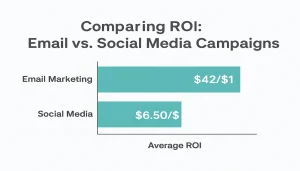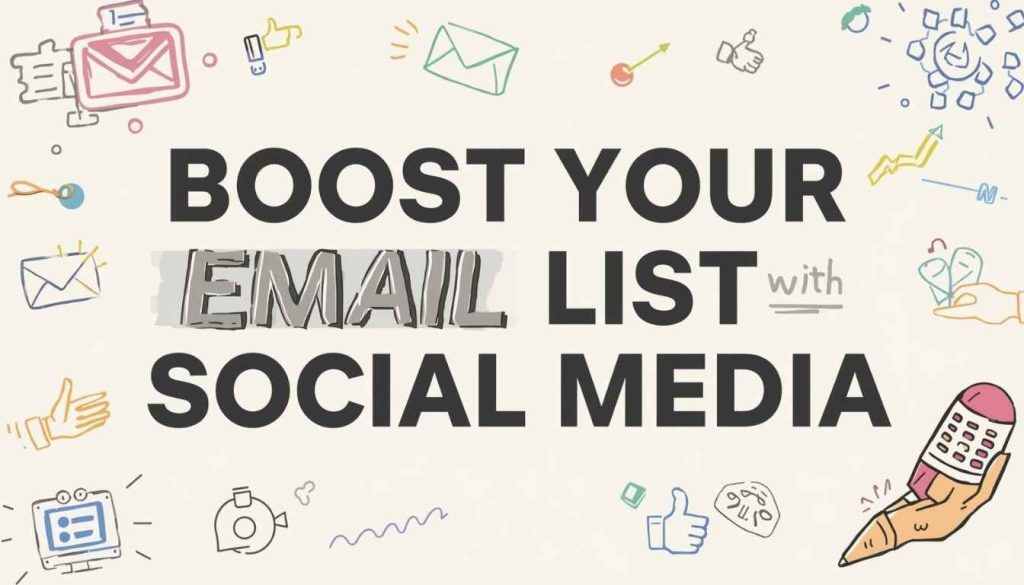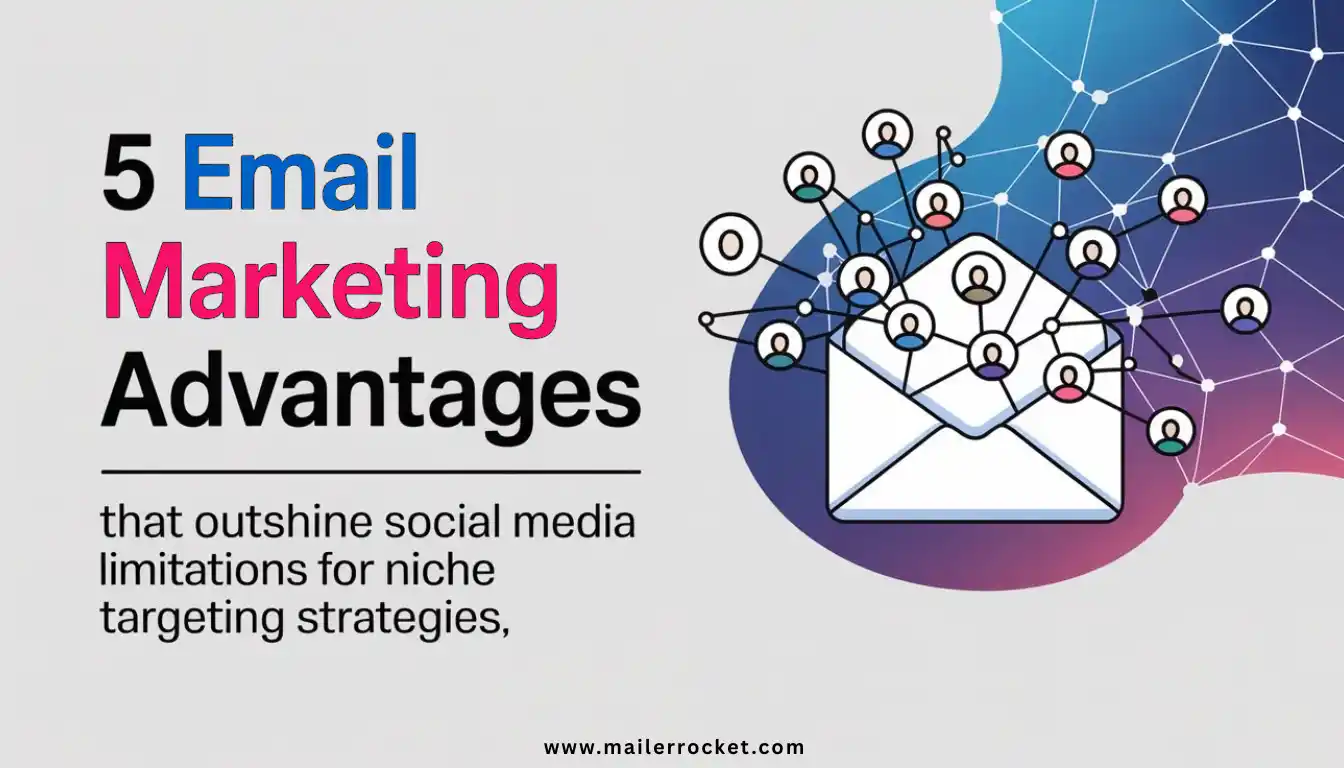In today’s competitive digital landscape, businesses need effective tools to reach their target audience. You require strategies that not only reach but also engage your specific niche.
Niche targeting is crucial for maximizing ROI, and email marketing advantages stands out as a superior method for achieving this goal. Unlike social media platforms, where your message can get lost in the noise, email marketing allows you to directly reach your audience with personalized content.
Key Takeaways
- Direct access to your target audience
- Personalized content for better engagement
- Higher ROI compared to social media
- Technical expertise for campaign optimization
- Reliable metrics for performance tracking
Maximize Your Marketing Impact with Email: The Ultimate Niche Targeting Tool
Discover why email marketing is essential for engaging specialized audiences and driving ROI—outperforming social media strategies.
The Current Marketing Landscape: Email vs. Social Media
As marketers navigate the complex digital landscape, understanding the strengths and limitations of both email and social media is crucial. The digital marketing ecosystem is constantly evolving, with various channels emerging and maturing over time.
The Evolution of Digital Marketing Channels
The rise of digital marketing has seen multiple channels come to the forefront, each with its unique characteristics and user engagement patterns. Email marketing, one of the earliest digital channels, has remained a stalwart due to its direct and personalized nature. In contrast, social media has grown exponentially, offering a platform for broader brand awareness and community building.
The Misconception of Social Media Supremacy
Despite its popularity, social media is not without its limitations. Algorithm changes can significantly impact organic reach, and the increasing competition for attention can make it challenging to stand out. Meanwhile, email marketing continues to offer a more stable and direct line of communication with customers, making it an essential tool for niche targeting strategies.
Understanding Niche Targeting in Modern Marketing
As marketing channels evolve, the importance of niche targeting in reaching and engaging with specific audience groups cannot be overstated. Niche targeting allows businesses to focus their efforts on a specific segment of the market, increasing the effectiveness of their marketing campaigns.
Defining Niche Markets and Their Importance
Niche markets are specialized segments of a larger market that have unique needs or preferences. Identifying and targeting these niches is crucial because it enables businesses to tailor their products, services, and marketing messages to meet the specific demands of these audiences, thereby increasing the likelihood of conversion.
The importance of niche markets lies in their potential for high engagement rates and customer loyalty. By focusing on a niche, businesses can establish themselves as authorities within that niche, fostering trust and credibility among their target audience.
| Characteristics | Niche Markets | Broad Markets |
|---|---|---|
| Target Audience | Specific, specialized | Wide, general |
| Marketing Approach | Tailored, personalized | General, broad appeal |
| Competition | Less competitive | Highly competitive |
The Challenge of Reaching Specialized Audiences
One of the primary challenges of niche targeting is identifying and accessing the specialized audience. This requires a deep understanding of the niche, including their preferences, behaviors, and pain points.
Effective niche targeting also demands precision in marketing messaging and the use of appropriate channels to reach the target audience. By overcoming these challenges, businesses can reap the benefits of niche targeting, including increased brand loyalty and higher conversion rates.
The Growing Limitations of Social Media Platforms
As you navigate the ever-changing landscape of digital marketing, you’re likely to encounter growing limitations on social media platforms. These limitations are not just minor inconveniences; they significantly impact your ability to reach and engage with your target audience effectively.
Algorithm Changes and Organic Reach Decline
One of the primary challenges you’re facing is the constant algorithm changes on social media platforms. These changes often result in a decline in organic reach, making it harder for your content to be seen by your followers. You’re having to adapt your strategies to keep up with these changes, which can be both time-consuming and costly.
Privacy Concerns and Data Restrictions
Privacy concerns have led to increased data restrictions on social media platforms. You’re now facing stricter regulations on how you collect, use, and store user data. This not only complicates your targeting efforts but also raises concerns about compliance with data protection laws.
Content Saturation and Attention Spans
The sheer volume of content on social media platforms has led to content saturation, making it difficult for your messages to stand out. Furthermore, decreasing attention spans mean that you have less time to capture your audience’s attention, adding another layer of complexity to your marketing efforts.
These growing limitations highlight the need for you to diversify your marketing strategies, potentially focusing on channels that offer more control and reliability, such as email marketing.
Email Marketing Advantages and Social Media Limitations for Niche Targeting Strategies
Email marketing remains a powerful tool for businesses aiming to connect with specialized markets, offering advantages that social media cannot match. As you navigate the complexities of digital marketing, understanding the strengths of email campaigns is crucial for effective niche targeting.

The Fundamental Differences in Approach
The approach to email marketing differs significantly from social media. While social media platforms are designed for broad outreach and engagement, email marketing allows for personalized communication with a targeted audience. This personal touch is crucial for niche markets, where the message needs to resonate deeply with a specific group.
- Direct access to the audience without algorithm interference
- Higher engagement rates due to personalized content
- Better segmentation capabilities for targeted campaigns
These differences underscore the value of email marketing in niche targeting strategies.
Why Email Remains Relevant in the Social Media Age
Despite the rise of social media, email remains a relevant and effective marketing channel. According to a recent study, email marketing continues to offer a higher return on investment (ROI) compared to social media. This is largely due to its ability to foster direct, meaningful connections with customers.
By leveraging targeted email campaigns, businesses can achieve a more significant impact in their niche markets, driving both engagement and conversions.
Advantage #1: Direct Ownership of Audience Relationships
Email marketing offers a unique benefit: the ability to own your audience relationships directly. This direct ownership is a cornerstone of effective marketing strategies, providing a level of control and flexibility that other marketing channels can’t match.
Platform Independence vs. Third-Party Vulnerability
When you build an email list, you’re creating a marketing channel that’s independent of third-party platforms. Unlike social media, where algorithm changes can drastically reduce your organic reach, email marketing gives you direct access to your audience without intermediaries. This independence shields your marketing efforts from the volatility of social media platforms, ensuring that your messages are delivered to your audience without interference.
The risks associated with third-party platforms are significant. Algorithm updates, policy changes, or even account suspensions can severely impact your ability to reach your audience. By contrast, email marketing puts you in control, allowing you to maintain consistent communication with your subscribers.
Learn how email marketing’s personalization and segmentation power can help you outperform social media in niche targeting.
Building Long-Term Assets Through Email Lists
An email list is more than just a marketing tool; it’s a long-term asset for your business. As you grow your list, you’re building a valuable resource that can be leveraged in various ways. Unlike social media followers, who are tied to a specific platform, your email subscribers have opted-in to hear from you directly, giving you a unique opportunity to foster deeper relationships.
| Marketing Channel | Ownership | Control |
|---|---|---|
| Email Marketing | Direct | High |
| Social Media | Third-Party | Low |
By focusing on email marketing, you’re not just choosing a marketing channel; you’re building a sustainable, long-term strategy that provides a strong foundation for your business. The direct ownership of audience relationships that email marketing offers is a critical advantage in today’s complex digital landscape.
Advantage #2: Superior Segmentation and Personalization Capabilities
One of the standout advantages of email marketing is its superior segmentation and personalization capabilities. This allows marketers to tailor their campaigns to specific audience groups, increasing the likelihood of engagement and conversion.
Behavioral Targeting Beyond Social Media’s Capabilities
Email marketing enables behavioral targeting that goes beyond the capabilities of social media platforms. By tracking user behavior such as purchases, website visits, and email interactions, you can create highly targeted campaigns. For instance, you can segment your audience based on their purchase history and send personalized recommendations.
- Track user behavior across multiple touchpoints
- Segment your audience based on detailed criteria
- Create personalized content that resonates with each segment
Dynamic Content Customization for Micro-Niches
Dynamic content customization is another area where email marketing excels. You can create content that changes based on the recipient’s preferences, behaviors, or demographic information. This level of customization allows you to effectively target micro-niches within your broader audience.
| Customization Element | Description | Benefit |
|---|---|---|
| Personalized Product Recommendations | Based on purchase history and browsing behavior | Increased sales and customer satisfaction |
| Location-Specific Offers | Targeted based on geographic location | Higher engagement and conversion rates |
| Dynamic Content Blocks | Change based on user preferences and behaviors | Improved relevance and user experience |
Leveraging Customer Data for Precision Targeting
Leveraging customer data is crucial for precision targeting in email marketing. By analyzing data from various sources, you can gain a deeper understanding of your audience’s needs and preferences. This information allows you to create targeted email campaigns that resonate with your audience and drive meaningful actions.
“The key to successful email marketing lies in understanding your audience and delivering content that meets their specific needs.”
By utilizing these advanced segmentation and personalization capabilities, you can significantly enhance the effectiveness of your email marketing campaigns. This not only improves engagement and conversion rates but also fosters stronger, more meaningful relationships with your audience.
Advantage #3: Higher Engagement and Conversion Metrics
One of the key advantages of email marketing over social media is its capacity to achieve higher engagement and conversion rates. This is particularly significant for businesses focusing on niche targeting strategies, where the ability to resonate with a specialized audience can make a substantial difference in campaign success.
Comparing ROI: Email vs. Social Media Campaigns
When comparing the return on investment (ROI) of email marketing campaigns to those on social media, email often emerges as the more effective channel. Studies have shown that email marketing can achieve an average ROI of $42 for every $1 spent, significantly outperforming social media.
| Marketing Channel | Average ROI |
|---|---|
| Email Marketing | $42/$1 |
| Social Media | $6.50/$1 (varies by platform) |

Why Email Drives More Meaningful Actions
Email marketing drives more meaningful actions because it allows for personalized communication with your audience. By segmenting your email list and tailoring your content, you can increase the relevance of your messages, leading to higher engagement rates.
Measuring Success Through Advanced Analytics
Advanced analytics play a crucial role in measuring the success of email marketing campaigns. By tracking metrics such as open rates, click-through rates, and conversion rates, businesses can gain valuable insights into their campaign’s performance and make data-driven decisions to optimize future campaigns.
Advantage #4: Greater Content Control and Formatting Freedom
With email marketing, you gain the power to control your content and formatting, allowing for a more tailored marketing approach. This flexibility is crucial for businesses aiming to create a unique brand identity and engage their audience effectively.
Escaping Platform Restrictions and Format Limitations
Social media platforms come with their own set of rules and limitations on content formatting and style. Email marketing frees you from these platform restrictions, allowing you to create content that is as engaging and creative as you want it to be.
Creating Immersive Brand Experiences via Email
The control over content and formatting enables you to craft immersive brand experiences. You can use various elements like images, videos, and interactive content to make your emails more engaging and personalized.
Testing and Optimizing Without Algorithm Interference
Unlike social media, where algorithm changes can significantly impact your content’s visibility, email marketing allows you to test and optimize your campaigns without such interference. This means you can focus on improving your content and subject lines based on direct feedback from your audience.
Advantage #5: Enhanced Privacy and Compliance Management
Email marketing offers a significant advantage when it comes to navigating the complex landscape of data protection regulations. As businesses increasingly rely on digital channels to reach their audiences, managing privacy and compliance has become a critical concern.
Navigating Data Protection Regulations
Data protection regulations such as GDPR and CCPA have transformed the way businesses handle customer data. Email marketing platforms are designed to help you comply with these regulations by providing features such as consent management, data encryption, and opt-out mechanisms.
To ensure compliance, it’s essential to:
- Obtain explicit consent from subscribers before sending marketing emails
- Provide clear information about how you will use their data
- Implement robust security measures to protect customer data
Building Trust Through Transparent Communication
Transparent communication is key to building trust with your audience. Email marketing allows you to be transparent about your data practices and communicate clearly with your subscribers.
By being open about how you collect, use, and protect customer data, you can foster a sense of trust and loyalty among your subscribers.
Future-Proofing Your Marketing Against Regulatory Changes
The regulatory landscape is constantly evolving, with new laws and amendments being introduced regularly. Email marketing platforms help you stay ahead of these changes by providing updates and features that ensure ongoing compliance.
By leveraging email marketing, you can future-proof your marketing strategies against regulatory changes, ensuring that your business remains compliant and competitive.
| Feature | Email Marketing | Social Media |
|---|---|---|
| Data Protection | Robust encryption and secure data storage | Limited control over data handling |
| Consent Management | Easy opt-in and opt-out mechanisms | Complex and often opaque |
| Compliance Updates | Regular updates to ensure compliance with new regulations | Limited support for compliance |
Implementing Effective Email Strategies for Niche Markets
To effectively target niche markets, businesses must implement tailored email strategies that resonate with their specialized audience. This involves a combination of precise list building, content that speaks directly to the niche, and automation that personalizes the customer journey.
Unlock the Power of Niche Targeting with Email Marketing
Use email to build lasting connections, enhance engagement, and drive conversions for your specialized audience.
List Building Tactics for Specialized Audiences
Building an email list for a niche audience requires targeted tactics that attract the right subscribers. You can achieve this by offering valuable content, such as whitepapers or webinars, that cater specifically to their interests. Utilizing audience segmentation tactics helps in categorizing your subscribers based on their preferences and behaviors, allowing for more personalized engagement.
Content Strategies That Resonate with Niche Segments
Creating content that resonates with niche segments involves understanding their unique challenges and interests. Your email content should be highly relevant and provide value to your subscribers. This can be achieved by using niche targeting strategies to tailor your messaging, ensuring it speaks directly to the needs of your audience.
Automation Workflows for Personalized Journeys
Automation plays a crucial role in personalizing the customer journey for niche audiences. By setting up automated email workflows, you can deliver timely and relevant content to your subscribers based on their actions and preferences. This not only enhances engagement but also builds a more personalized relationship with your audience.
Integrating Email and Social Media for Maximum Impact
To maximize your marketing impact, it’s crucial to integrate your email and social media strategies effectively. By doing so, you can leverage the strengths of both channels to enhance your overall marketing performance.
Using Social Media to Grow Your Email List
You can utilize social media platforms to drive traffic to your email sign-up pages, offering incentives such as exclusive content or discounts to encourage subscriptions. This approach helps you tap into your social media audience and convert them into email subscribers.
- Promote your email newsletter on social media profiles
- Share snippets of exclusive email content
- Use social media advertising to target potential subscribers

Repurposing Email Content Across Platforms
Repurposing your email content for social media can help maintain a consistent message across channels. You can break down longer email content into bite-sized social media posts or use email content as a basis for social media campaigns.
Key strategies include:
- Turning email newsletters into social media series
- Using email subject lines as social media post teasers
- Sharing email-exclusive offers on social media
Creating Cross-Channel Campaigns for Niche Audiences
By integrating email and social media, you can create cohesive campaigns that target your niche audience more effectively. This involves synchronizing your messaging, timing, and content across both channels to maximize impact.
For instance, you can use social media to tease an upcoming email campaign, then follow up with the email, and finally retarget your audience on social media with related content.
Conclusion: Leveraging Email’s Advantages in Your Marketing Strategy
As you’ve seen throughout this article, email marketing offers distinct advantages over social media for niche targeting strategies. By leveraging email marketing advantages, you can create a tailored marketing approach that resonates with your specialized audience.
The key benefits of email marketing, including direct ownership of audience relationships, superior segmentation and personalization capabilities, higher engagement and conversion metrics, greater content control, and enhanced privacy and compliance management, make it an indispensable tool for businesses targeting niche markets.
To maximize your marketing impact, consider integrating email marketing into your overall strategy. This involves building and segmenting your email list, creating personalized content, and using automation workflows to nurture leads. By doing so, you’ll be able to adopt a tailored marketing approach that drives meaningful actions and conversions.
Ultimately, a well-executed email marketing strategy allows you to connect with your audience more effectively, fostering loyalty and driving business growth. As you refine your marketing efforts, prioritize email marketing to unlock its full potential and stay ahead in today’s competitive landscape.


